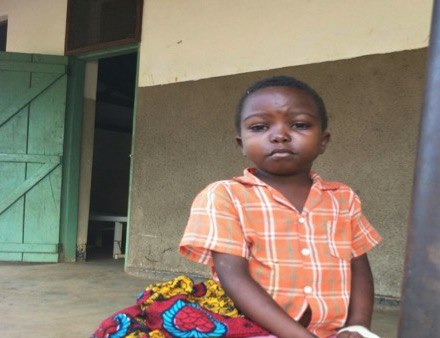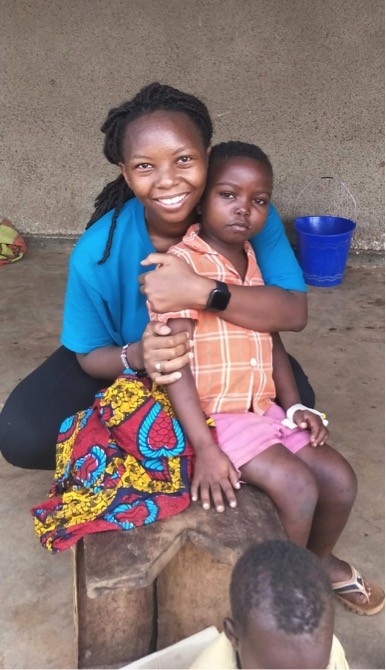What Is Ailing Our Children?

Ruth Kahira is one of our dedicated international volunteers. She is serving as a nurse at St. Therese Hospital in South Sudan. In this piece, Ruth reflects on a patient named Pasqual and the reality of his disease in a community where routine health check-ups are uncommon, and making the long and difficult journey to the hospital is reserved only for the very sick.
As I approach the little boy I have been requested to perform some observations on, I am struck by his labored breathing and the sad expression on his face. He won’t smile at me no matter what I do. “He is probably in a lot of pain,” I say to myself. As we struggle to get his blood pressure and weight, I continue to be quite saddened by the state of this little boy. He is so sick, and he is only seven-years-old.
The little boy I speak about is Pasqual, and he is the most delightful little seven-year-old I have ever met. Despite having severe kidney disease, he manages to always be polite and comply with whatever is asked of him. Never wanting to bother his mother who is still breastfeeding his younger brother, Pasqual quietly fights this disease that has plagued his young precious life.
This disease and his long history with hospitals has matured him in a way. I feel sad for his lost youth and childhood. He should be out in the fields playing with his friends, he shouldn’t be here. Alas, I quickly put those thoughts aside, there is no time for wallowing in pity, there is too much work to do here.
Nephrotic syndrome: The Technical Bit
Nephrotic syndrome is a type of kidney disease that indicates kidney damage, notably to the glomeruli — the filtering parts of your kidney. This damage leads to the release of an important protein that should remain in the body, out through urine.
Although the reason why nephrotic syndrome occurs is unknown, researchers have linked some diseases and infections including, malaria, streptococcal infection, and diabetes with nephrotic syndrome.
Typically, children will present with edema (swelling), albuminuria (albumin or globular protein in the urine), hypo albuminuria (low blood levels of albumin) and hyperlipidemia (high levels of blood cholesterol). *Source:NIDDK, 2019. What is childhood nephrotic syndrome.
Back to Pasqual
Young Pasqual has had this condition for the majority of his life and the poor environment he lives in does not help his situation. His little body is covered in marks, probably scars from previous skin infections. Unfortunately, this may be the reason he has kidney failure. It boggles the mind that such a simple thing as access to clean water to bath in and a lack of available treatment for skin infections, has led to a debilitating disease such as this — a disease that has reduced this child’s life expectancy; giving him a life sentence.
In any other part of the world, Pasqual would have regular follow-ups with a kidney specialist, access to good and effective drugs, and possibly wouldn’t be as sick as he is.
Just as soon as Pasqual has been admitted we get another little girl, only five-years-old with the same condition. The presentation is pretty much identical to Pasqual, low income struggling mother with multiple children, one is still breastfeeding.
The little girl is wailing in her discomfort, her large stomach makes it difficult for her to move, breath, and even to sleep. Juba, where these kids could at least get to see a specialist, seems so far away right now (6+ hours by road, if you can find a vehicle). Also, they would have to find the means to pay for travel and accommodations in Juba, where the community is already stretched so thin. Only those with some family and work connections or access to enough money ever get to leave this county.
All the staff members have rallied around these two young children to regularly monitor their blood work and medication administration, as well as convey any changes in their conditions to our doctor. There is only one permanent doctor at St. Therese hospital, serving a catchment area of over 90,000 people.
After intensive treatment on the ward for several weeks, both Pasqual and the little girl, Gamboripai, went home. Pasqual’s symptoms lessened and his swelling went down enough for him to return to school, but little Gamboripai’s condition has only improved marginally.
If you commit to come and work here, your service won’t be rewarded by money or fame, but smiles, prayers, hugs, and eternal gratitude from this little corner of Africa.
This is not surprising. Nephrotic syndrome can be primary, originating in the kidney itself or secondary, originating from diseases like diabetes or lupus. We have no way to test these children to determine whether their syndrome is primary or secondary, and so we have little choice but to apply the same treatment regimen to both and hope for the best.
They both still return for regular checkups, but transport and distance, not to mention a mother’s other responsibilities (other children, collecting water, finding food), all create challenges and obstacles to ensure consistent follow-up. Both children live in remote parts of Nzara county and coming to the hospital is reserved for only the very sick.
What we desperately need is access to better health services for this community, better diagnostics, better drugs, more volunteer and local doctors, nurses, physiotherapists, occupational therapists etc. who could help keep these children from dying so young.
If you commit to come and work here, your service won’t be rewarded by money or fame, but smiles, prayers, hugs, and eternal gratitude from this little corner of Africa.

